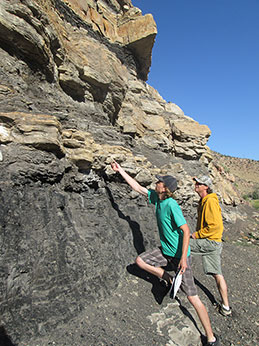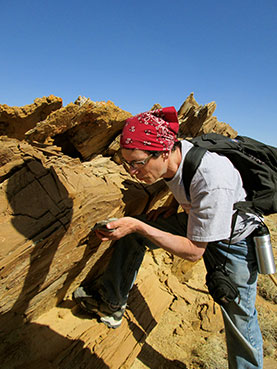Getting Your Degree in Geology
Here is a four year plan in earning your Geology degree at Southern Utah University.
- Learn how you can fund your degree.
- Resources for your resume.
- Information on the course catalog.
Year 1 - Observe and Ask Questions
Put together a four-year plan with your advisor. Be sure to complete College Algebra (MATH 1050) during your first semester and Principles of Chemistry I (CHEM 1210) by the end of the year. Start creating your curriculum vitae/resume. Go on field trips and have fun!
Summer 1 - Get a paid internship through IIC!

Year 2 - Hypothesize
Start thinking about research topics that interest you and talk to your professors about possible ideas. Be sure to take math, physics, and chemistry courses every semester (talk to your advisor). Get experience working with upperclassmen doing research in the field!
Summer 2 - Get a paid internship!

Year 3 - Investigate
Develop your research hypothesis and complete your research. Identify possible graduate advisors or career opportunities that interest you. Attend a professional conference and submit your research for publication!
Summer 3 - Take the Graduate Record Exam (GRE). Get a paid internship or attend Field Camp!

Year 4 - Report Your Results
Present your research at a professional conference. Apply to graduate school or career opportunities that interest you and graduate!
Summer 4 - Complete Field Camp and get ready for graduate school or your new career!

Advice from Recent Graduates
- Meet with your advisor at least two weeks prior to registration every semester.
- Go interdisciplinary! Work with multiple professors on an interdisciplinary research project. Bring in chemistry, physics, biology or outdoor recreation.
- Get into research early. All levels of research projects are available so even freshmen can get experience. Often, upperclassmen need assistance in the field or processing data. Talk to your professors about these opportunities.
- Attend as many field trips and symposia as you can! These look great on your curriculum vitae/resume and are so much fun!
- Attend a conference with your peers before you have to present your own research. Many students have said that attending an early conference helps them learn what to expect and that the experience contributed greatly to their own success when it was their turn to present. Funding is not available to students who are not presenting research; however, sharing expenses with students who are presenting can significantly reduce costs.
- Apply to the Honors Program to distinguish your education and multiply your opportunities. Be a part of the adventure, join Partners in the Park for summer travel with other honors students from around the country (scholarships available). Increase funding opportunities for research and travel. Discover more opportunities to present and publish your work. Share your ideas and enthusiasm with students like yourself.
- Apply for membership in Sigma Gamma Epsilon (SGE), the national honor society in earth sciences.
- The GIS certificate is an excellent supplement to your degree, particularly for those planning on going directly into the workforce. Ask your professors how this certificate might benefit you and your career.
- Run for a leadership position in Geology Club or Sigma Gamma Epsilon (SGE)!
- When applying for graduate school, be sure to include a range of opportunities just in case your first choice doesn’t come through. Sometimes funding just isn’t available in the department you hope to work with on research.
